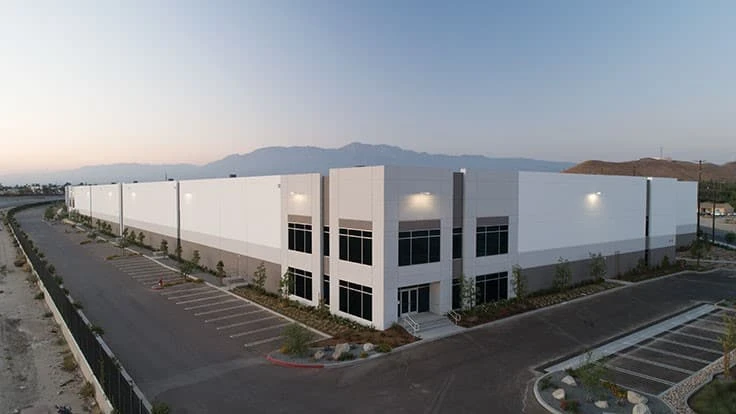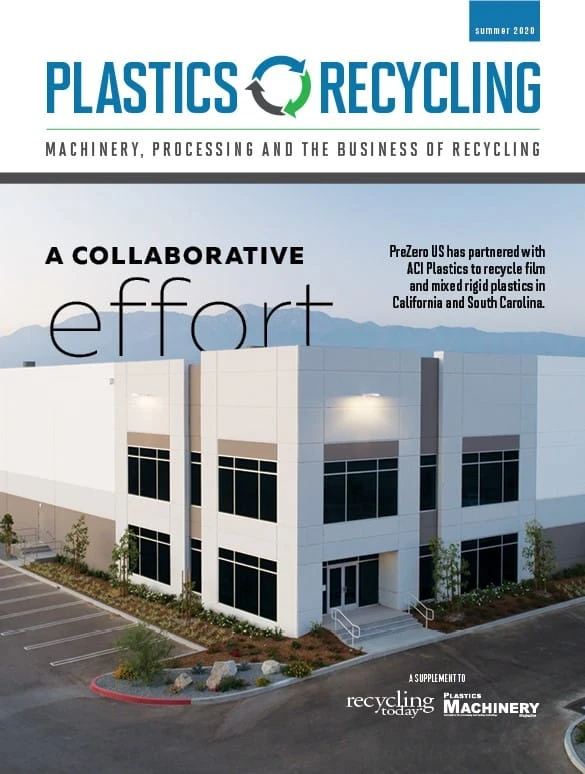
PreZero

Thomas Stallkamp, the founder and principal of Collaborative Management LLC, a private supply chain consulting firm, has been quoted as saying, “The secret is to gang up on the problem rather than each other.” Many have identified end-of-life plastics as a problem that needs to be addressed, and PreZero US Inc., with headquarters in Los Angeles, appears to have embraced Stallkamp’s philosophy. The company says it seeks to form strategic partnerships and joint ventures that will help it to build the infrastructure necessary for a circular economy in the U.S.
PreZero US’ most recent collaboration is with processing partner ACI Plastics, headquartered in Flint, Michigan. Together, the companies plan to recycle mixed rigid plastics (MRP) and plastic film at two locations in California and South Carolina.
Collaborative approach
“PreZero US is a recycling company that is looking to develop closed-loop solutions for waste through collaboration,” says Hendrik Dullinger, vice president of business development for PreZero US.
He mentions the need for a holistic approach to recycling. “To be most effective, it’s imperative to encourage manufacturers to use materials that are conducive to creating closed loops. When every player in the flow of materials works together on the same page, we can create a more circular economy. This philosophy is embedded in the name PreZero,” Dullinger says. “We prethink traditional recycling processes and work with our customer base in order to move closer to zero-waste solutions.”

The company, formed in 2018, is the U.S.-based subsidiary of Germany-based PreZero, a leading waste disposal and environmental services provider. With 3,000 employees and more than 80 locations, PreZero offers waste disposal services as well as sorting and processing of recyclables. Its parent company is the German retailer Schwarz Group, which owns and operates the Lidl and Kaufland chain store brands.
PreZero set its sights on expanding in the U.S. because it recognized the lack of recycling capacity in the country. This fact coupled with the shrinking international market for plastic scrap made locating in the U.S. attractive, Dullinger says. PreZero also has plans to expand into Asia.
“Since arriving in the U.S., PreZero’s strategy aims to focus on infrastructure and equipment investments, supplier/buyer partnerships and collaborations with local operating partners,” he continues. “All company activities aim towards scaling sustainable innovations that close the loop and support a circular economy.”
PreZero US seeks to implement a vertically integrated model that will allow it to serve a broad range of customers through collection services and recycling facilities, Dullinger says.

PreZero US currently employs approximately 80 people. “We expect to have an additional 40 employees at each facility once they are fully operational,” he adds. Other employees who will technically be employed by PreZero’s partners will work at these facilities.
As its processing partner, ACI brings more than 30 years of plastics recycling expertise to the table. The company was founded in 1986 and is currently owned by President Scott Melton. ACI separates and recycles commingled plastics, producing various commodity- and engineering-grade recycled-content resins. It perhaps is best known for developing paint-removal technology for thermoplastic olefins, polypropylene (PP), acrylonitrile butadiene styrene (ABS) and polycarbonate/ABS parts and regrind. The company owns and operates facilities in Michigan, Nebraska and South Carolina.
Dullinger says the companies’ leaders first met two years ago at a plastics recycling conference. “Scott was looking for a partner, and so were we.” They formed their partnership approximately a year and a half ago.
The company cultures at ACI and PreZero US are similar, Dullinger says, making the partnership a good fit.
“We both understand the market and how to create a good product,” Melton says.
Dullinger says PreZero US is partnering with ACI where it makes the most sense. “We may have other partners in food waste and other sectors,” he explains, as the company has targeted materials beyond plastics for processing.
In addition to partnering with processors, he says PreZero also partners with the manufacturing sector “to feed recycled materials back as a new raw material. This process is a critical contribution to closing the loop in a circular economy model, providing the most sustainable end-of-use outlets for materials throughout the value chain,” Dullinger adds.
Targeted plastics
PreZero US has partnered with ACI to operate recycling facilities in Jurupa Valley, California, and in Westminster, South Carolina, that specialize in recycling A- and B-grade low-density polyethylene (LDPE) and linear LDPE (LLDPE) film as well as MRP. The California plant will have the capacity to process more than 13,000 tons of film annually to start, while the South Carolina plant will process 30,000 tons of MRP annually, with plans to increase that to 40,000 tons in the first year of operation, the companies say. Both facilities will be able to process both material streams once they are fully developed in 2021.
“Given the dwindling international markets for film and mixed rigid scrap plastic waste, PreZero saw an opportunity to develop processing facilities for these materials domestically,” Dullinger says, adding that the decision also was informed by market research and due diligence by ACI and PreZero US.
PreZero US will produce recycled polyethylene (PE), LDPE, LLDPE and PP pellets that are consistent from batch to batch, Melton says.
“All PreZero resins will be tested to ensure quality and consistency,” he says. “All facilities will have labs on-site that will certify using both ASTM [International] and ISO [International Organization for Standardization] test methods.”
The business partners say they have joined a series of novel and established technologies to produce pellets of high and consistent quality that can be remanufactured into products of equal or higher value.
“Since arriving in the U.S., PreZero’s strategy aims to focus on infrastructure and equipment investments, supplier/buyer partnerships and collaborations with local operating partners. All company activities aim towards scaling sustainable innovations that close the loop and support a circular economy.” – Hendrik Dullinger, PreZero US
“In both the Southern California and South Carolina facilities, what sets us apart is the type of equipment we are purchasing and the process around it that will enable us to make a consistent high-quality finished PCR [postconsumer resin] product,” Melton adds.
The plants will be equipped similarly with shredders, sorters, wash lines, extruders and blenders, though the business partners have declined to provide details about the technology.
Dullinger says the companies are testing material from either coast that could trigger some changes to the equipment they use.

“We have purchased the most advanced equipment available today and have chosen vendors who will work with us as we expand and they bring new technologies to the market,” he adds.
Max Bracey, PreZero US marketing manager, says the two plastics recycling plants will be operational in the third quarter of this year. This is slightly later than originally planned because of the COVID-19 pandemic, which has caused some delays with permitting and engineering.
Procurement & marketing
Large-volume generators, such as warehouses and distribution centers, as well as retailers and commercial recyclers will supply the film processed at the PreZero US plants, Dullinger says.
Material recovery facilities (MRFs) largely will supply the MRP, though he adds that some might come from commercial recyclers or commercial generators. “We don’t yet know the exact mix,” Dullinger says, adding that commercial collectors now are providing the bulk of this material for testing and startup. “That is expected to switch soon.”
Melton says the average yield of the MRP bales the companies have tested so far is 70 percent PE and PP, while polyethylene terephthalate accounts for 7 to 10 percent of the bales by weight.
“In both the Southern California and South Carolina facilities, what sets us apart is the type of equipment we are purchasing and the process around it that will enable us to make a consistent high-quality finished PCR product.” – Scott Melton, ACI Plastics
“We’ve tested 40 bales of MRP from different MRFs—some have been not so pleasant,” he adds. However, most of them have conformed to the PreZero’s MRP bale specification of plastic drums, crates, buckets, baskets, toys, refuse totes and lawn furniture with less than 20 percent contamination by weight. Melton says the quality of these bales depends on the MRF. “Paying attention to the quality of the MRP bales they create will provide them value; it’s an incentive for them to create something good,” he adds.
Melton acknowledges that commodities markets fluctuate, adding, “However, we have stabilized conversion costs and designed our process so it will tolerate these changes and yield a consistent return on investment.”
PreZero US’ LDPE and LLDPE resins will be sold to injection molders, blow molders and bag manufacturers, while its PE and PP resins will be sold to manufacturers of automotive parts, piping, casings, toys and consumer goods, among others, Melton says.
“Given the current sustainability goals of big brands and retailers, there is a strong demand for recycled resins in the market that is only projected to grow in the next five years,” Dullinger says.

Lower crude oil prices brought on by the COVID-19 pandemic does cause concern for PreZero US and ACI, Dullinger says, as these low prices have led to lower virgin resin pricing, which is compounded by the excess virgin PP and PE on the market. However, he says he is hopeful consumer goods brands will stick with their public recycled content commitments.
“People who need PCR need PCR,” Melton says.
In some areas, recycled content legislation also helps to ensure demand for PreZero US’ resins. California, for instance, mandates that reusable plastic bags sold in the state contain a minimum of 40 percent recycled content.
Future-focused
PreZero US’ plans do not stop with its California and South Carolina locations. Dullinger says the company expects to add at least three more sites in the next four years. “Whether we are going to focus on the same materials is to be determined,” he says. “We might also consider retrofitting the first two sites depending on market innovation and demand shifts.”
PreZero US is evaluating color sorting and deinking technologies and food-grade certifications. “The deinking technology would help with the B-grade film pellets if we could supply virgin-like, clear material,” Dullinger says.
Production of food-grade PE and PP would open more opportunities for the company in the consumer goods sector and help PreZero US close the loop for this packaging, he adds.
Bracey says cosmetics and self-care companies also have expressed an interest in this material.
In terms of the geography of future locations, Dullinger says the Great Lakes region and Texas present opportunities. “We are interested in densely populated markets where you can collect a lot of material with short transportation legs.”
Regardless of geography, PreZero US’ future growth is sure to include collaboration with processing partners and the consumers of the recycled materials it produces.

Explore the Summer 2020 Plastics Recycling Issue
Check out more from this issue and find your next story to read.
Latest from Recycling Today
- BMW Group, Encory launch 'direct recycling’ of batteries
- Loom Carbon, RTI International partner to scale textile recycling technology
- Goodwill Industries of West Michigan, American Glass Mosaics partner to divert glass from landfill
- CARI forms federal advocacy partnership
- Monthly packaging papers shipments down in November
- STEEL Act aims to enhance trade enforcement to prevent dumping of steel in the US
- San Francisco schools introduce compostable lunch trays
- Aduro graduates from Shell GameChanger program

















